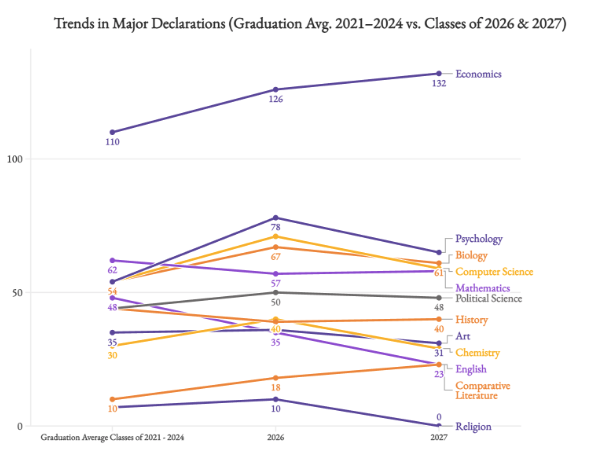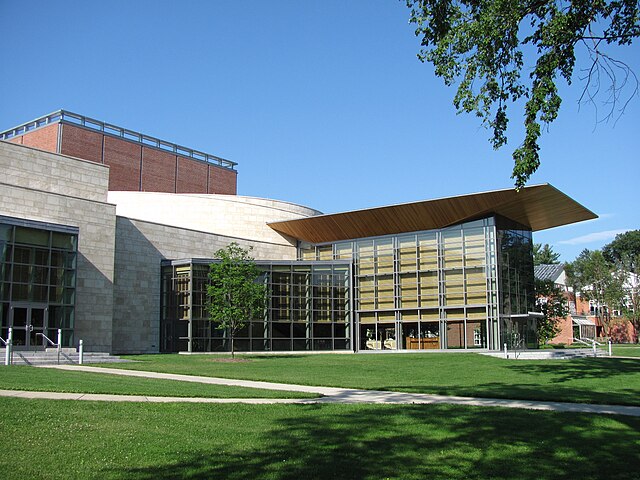On June 30, the College’s Teach It Forward (TIF) campaign ended, having raised $707 million and engaged more than 87 percent of current alumni.
TIF, which began development in 2013, had the initial goal to engage 85 percent of alumni and fundraise $650 million towards capital building projects, financial aid, faculty support and co-curricular student experiences. The campaign developed over seven years and three College presidencies, and it launched its public phase in 2015.
Alumni engagement varied widely but was categorized into four main types: gift donation, event attendance, volunteering opportunities and online involvement. Student mentorship, particularly with career development, was a popular mode of engagement. Many alums connected with students through EphLink and aided them through interviews and employment searches. Others wrote notes of appreciation for retiring faculty, voted in trustee elections and interacted with the College’s social media.
Reunions, also a popular method of engagement, helped set the lifespan and schedule of the campaign. “Every class celebrates a reunion every five years, so [the campaign] allows for focus on each reunion cohort over a five-year period,” Vice President for College Relations Megan Morey said.
Notable capital projects under TIF included renovations of the ’62 Center for Theater and Dance, the Class of 1966 Environmental Center, Horn Hall and Weston Hall. According to Morey, a capital project that especially generated alumni interest was the Pond House for Wellbeing, which now houses the offices for the College’s Integrative Wellbeing Services. Overall, $143 million was directly allocated to capital building projects under the campaign.
Of the $143 million, $106 million was channeled into building the South Science Building. Science education development was listed as a priority for TIF, with current students working in faculty laboratories, incoming students arriving for the intensive five-week Summer Science Program and 50 students co-authoring scientific papers with professors annually. During the campaign, $8.5 million in grants was awarded from the National Institutes of Health and the National Science Foundation in support of faculty-student research.
An additional priority of TIF has been financial aid for students. Through its contributions under the Alumni Fund and Parents Fund, TIF donated to the book grant program that provides textbook and course material coverage for students on financial aid. Morey noted that TIF’s support for financial aid also went toward allowing aided students to waive their earning contributions for one summer, as announced in Jan. 2019.
$58 million from TIF went toward faculty support and resources, including faculty recruitments and the opening of new tenure-track lines. In addition, campaign money went into endowed professorships, with earnings accrued from endowed positions going directly to support the faculty member in those roles. Notably, in collaboration with TIF, the Williams Black Alumni Network (WBAN) launched an initiative to raise $500,000 in support of Bolin Fellowships, which are designed “to promote diversity on college faculties by encouraging students from underrepresented groups to complete a terminal graduate degree and to pursue careers in college teaching,” according to the College’s faculty site. This WBAN and TIF partnership ultimately raised $712,000 for Bolin fellows.
The final portion of TIF fundraising was directed toward broadly defined “Beyond Williams” and “Beyond the Classroom” initiatives. A gift from the Class of 1968 at their fiftieth reunion saw a revamped Career Center that now hosts alumni-sponsored summer internships, recruiting opportunities, job fairs, information centers and career treks. The Center for Learning in Action, where over 1,200 students have been involved in community outreach in the greater Berkshire region, was also expanded.
Ultimately, Morey described the campaign as “extraordinarily successful,” commending the loyalty of the Williams community and the eagerness of the alumni network to “support students and faculty of today.”








